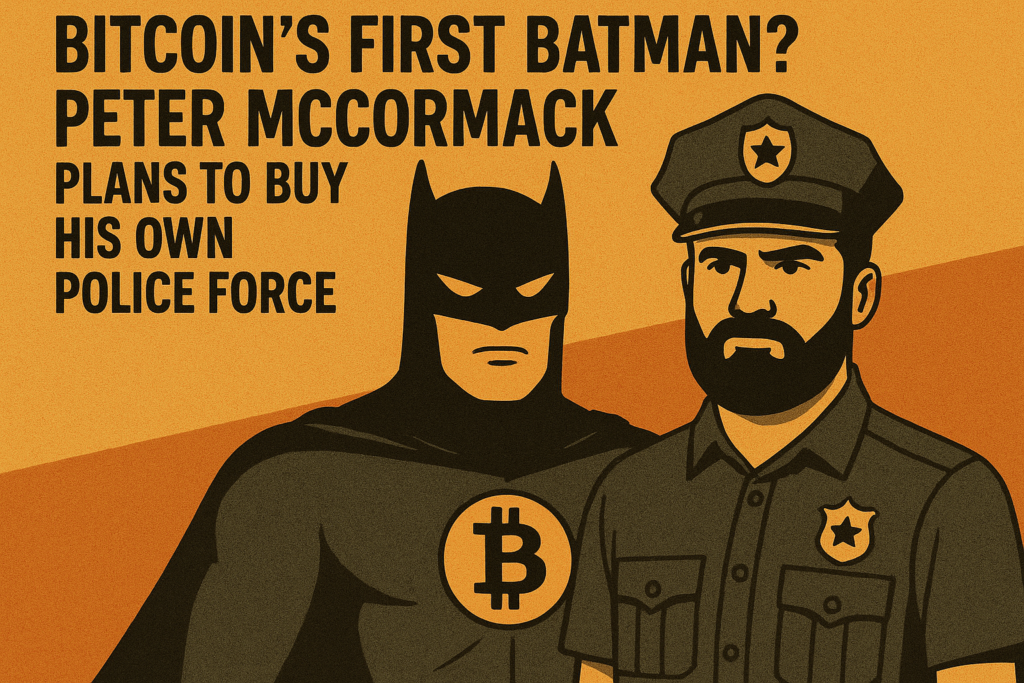Bitcoin’s first Batman? Peter McCormack plans to buy his own police force

Bitcoin advocate Peter McCormack is once again sparking conversation in both law enforcement and cryptocurrency communities—this time with a bold, vigilante-style initiative that feels like something out of a comic book, yet resonates powerfully with the ethos of decentralization.
Understanding Peter McCormack’s Radical Initiative
Peter McCormack, a highly vocal Bitcoin (BTC) maximalist and host of the widely followed podcast ‘What Bitcoin Did,’ is extending his influence far beyond audio broadcasts and the soccer field. In addition to owning Bedford FC, a football club in his hometown of Bedford, UK, McCormack is now attempting to disrupt an entirely different space—community safety. His latest ambition? Launching a privately funded security force that operates independently of the traditional police.
McCormack argues that local law enforcement is stretched too thin, underfunded, and ill-equipped to maintain safety standards in Bedford. He highlights growing concerns near his football club and believes that existing public services are no longer delivering results. Instead of filing complaints or waiting for bureaucratic processes to catch up, McCormack is taking matters into his own hands—literally. He plans to roll out a privately contracted policing unit financed through personal and possibly community crypto assets, aimed at proactively securing neighborhoods, infrastructure, and events in Bedford.
The proposed initiative is not just about safety—it’s about decentralization. Just as Bitcoin aims to democratize finance, McCormack’s project seeks to decentralize public safety, giving power back to the people in the most literal sense. Supporters of decentralization in the blockchain world have long envisioned such community-led, tech-enabled alternatives to government-run systems. In McCormack’s case, the mission is a direct manifestation of crypto’s libertarian bent—resilience, sovereignty, and autonomy applied not to money, but to public order.
Implications for Crypto Investors
For crypto investors and entrepreneurs, McCormack’s move is more than just a fringe experiment—it’s a potential blueprint for decentralized civic infrastructure development. If decentralized finance (DeFi) can replace traditional banks and intermediaries, could decentralized security forces one day replace police? Could independent units, funded by crypto wallets or DAOs (Decentralized Autonomous Organizations), act as guardians of both digital and physical assets?
Such thinking opens up novel avenues for innovation and investment. Imagine gated communities, tech hubs, or Web3 gatherings hiring decentralized, token-funded security teams instead of traditional contractors. These squads could be managed via on-chain voting mechanisms and paid through smart contracts, ensuring transparency, accountability, and efficiency in their operations.
The implications also stretch into cyber security. High-net-worth investors, particularly those with significant crypto holdings, are increasingly targeted by cybercriminals and, occasionally, by physical threats. Having private security—including digital monitoring and real-world response teams—funded and managed through crypto could turn out to be both a prudent move and a lucrative sector.
In this light, McCormack isn’t just launching a private police unit. He’s piloting the adaptation of blockchain-backed community governance in real-world scenarios. For investors, this translates to early exposure opportunities in emerging sectors like DAO security services, decentralized governance platforms, and token-fueled civic tech networks.
Financial and Strategic Considerations
Security—both digital and physical—has always been a necessary expense for affluent individuals. But the rise of crypto has forged a new class of wealthy, often-anonymous investors who are increasingly at risk of being doxxed, stalked, or worse. As the public begins to understand the immense, sometimes portable nature of crypto wealth, investment in private security will likely surge.
McCormack’s initiative illustrates how crypto can be leveraged to meet this demand. Unlike traditional security firms tied to outdated procurement and contractual models, decentralized security ventures can employ a pay-as-you-go model powered by smart contracts. Payment for services could be handled instantly via crypto wallets with built-in, auditable transaction histories, eradicating frictions associated with invoicing, disputes, or escrow requirements.
This vision extends to tokenomics. A dedicated token for community policing efforts could democratize decision-making on patrol hours, zones of operation, and officer evaluations. Stakeholders could vote on security policies via DAO mechanisms, effectively turning neighborhood safety into a participative governance process.
Crypto’s inherent borderlessness also comes into play. A successful pilot in Bedford could inspire copycat initiatives in other towns, cities, or private communities globally, each tailored with local governance but coordinated through shared protocols or even interoperability standards. It points to the creation of an entirely new financial sub-sector—decentralized civilian security—which could rise alongside existing sectors like DeFi, NFTs, and the metaverse.
Market Impacts and Broader Adoption
If Peter McCormack proves successful in demonstrating the functionality and reliability of a crypto-backed security force, it could trigger a domino effect throughout the crypto industry. Particularly in areas with waning faith in public institution effectiveness, decentralized alternatives may find ready markets. VCs and institutional investors could begin diverting capital not just into financial blockchain applications, but also into civic tech solutions that replace or augment social infrastructure.
Imagine early Bitcoin adopters contributing to region-specific security DAO tokens, pooling together assets to protect specific physical spaces—from residential neighborhoods to server farms hosting key nodes. Governance would stem from token-holder consensus, while funding would be seamless and cross-border. These aren’t just futuristic ideas—they’re real use cases now brewing thanks to initiatives like McCormack’s.
This evolution also poses significant challenges. Local governments may view such efforts as undermining state authority. Legal frameworks are currently ill-prepared to deal with quasi-private police forces funded through unregulated crypto assets. What happens when a token-funded guard force crosses a jurisdictional boundary? Are they held to the same standards of accountability and legal liability?
While some might hail these efforts as progressive moves toward democratized public safety, others will consider them dangerous precedents. Governments could respond by implementing stricter regulations on how cryptocurrencies can be used in public services, escalating the already complicated legal status of blockchain projects. Conversely, jurisdictions with lax regulation may become incubators for such initiatives, turning into test laboratories for decentralized public infrastructure.
What Comes Next: The Future of Crypto and Public Services
At the intersection of crypto ideology and civic responsibility lies a fertile ground for transformation. Peter McCormack’s private police initiative isn’t just a publicity stunt or localized social experiment—it represents another step in the convergence of blockchain and real-world utility. As financial sovereignty becomes more commonplace, other aspects of self-sovereignty, including personal and community safety, will become the next frontier.
For those deeply embedded in the crypto space, this initiative represents a compelling inflection point. It challenges centralized institutions not just economically, but now professionally and jurisdictionally. The same way Uber disrupted transportation and Airbnb challenged the hotel industry, decentralization may soon question the monopoly of local governance over service delivery—including law enforcement.
Moreover, if such models prove scalable and sustainable, we may witness the formation of entire subnetworks of economies and services operating parallel to—or even outside of—state structures. These would be bound not by geography but by shared protocols and token-based governance. Think virtual nations operating with real-world assets and responsibilities.
Conclusion
Peter McCormack’s ambitious plan to establish a privately funded security force may seem unconventional, even controversial, but it reflects a broader trend emerging within the crypto landscape—the practical expansion of decentralization principles into everyday life. What began with finance is now rapidly seeping into societal foundations such as governance, justice, and safety.
Far more than a side story, McCormack’s venture illustrates a future where safety is not just a constitutional right or government duty but a participatory, token-driven utility managed by the community for the community. For crypto investors, this represents both a philosophical victory and a potentially explosive growth sector. As the world inches closer to decentralized everything, being early to new verticals like decentralized security could be as revolutionary—and profitable—as buying Bitcoin at $100 was.







